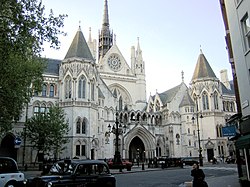Court of Appeal (England and Wales)
| The Court of Appeal (COA) |
|
|---|---|

|
|
| Established | 1 November 1875[3] |
| Country |
United Kingdom (England and Wales) |
| Location | Royal Courts of Justice, Strand, City of Westminster, London, UK |
| Authorized by |
|
| Decisions are appealed to |
|
| Website | https://www.judiciary.gov.uk/you-and-the-judiciary/going-to-court/court-of-appeal-home/ |
| Lord Chief Justice of England and Wales | |
| Currently | Sir Ian Burnett |
| Since | 2 October 2017 |
| Master of the Rolls | |
| Currently | Sir Terence Etherton |
| Since | 3 October 2016 |
The Court of Appeal (COA, formally "Her Majesty's Court of Appeal in England") is the highest court within the Senior Courts of England and Wales, and second only to the Supreme Court of the United Kingdom. Part of the courts of the United Kingdom, it was created in 1875, and today comprises 39 Lord Justices of Appeal and Lady Justices of Appeal.
The court has two divisions, Criminal and Civil, led by the Lord Chief Justice and the Master of the Rolls respectively. Criminal appeals are heard in the Criminal Division, and civil appeals in the Civil Division. The Criminal Division also hears appeals from the Crown Court, while the Civil Division hears appeals from the County Court and High Court of Justice. Leave to appeal is normally required from either the lower court or the Court of Appeal itself; and with leave, further appeal may lie to the Supreme Court.
The appeal system before 1875 was "chaotic". The superior courts system consisted of 12 different courts, with appeal on common law matters to the Court of Exchequer Chamber, chancery matters to the Court of Appeal in Chancery and other matters to the Privy Council. This was the subject of a review by the Judicature Commission, established in 1867 to consider the creation of a "Supreme Court" (a High Court and Court of Appeal). The result was published in 1869. The recommendation was that there should be a common system of appeal from all of the High Court divisions, with a limited set of appeals allowed to the House of Lords. This reform was implemented by the Judicature Acts, with the Appellate Jurisdiction Act 1876 giving an almost limitless right of appeal to the Lords.
...
Wikipedia
